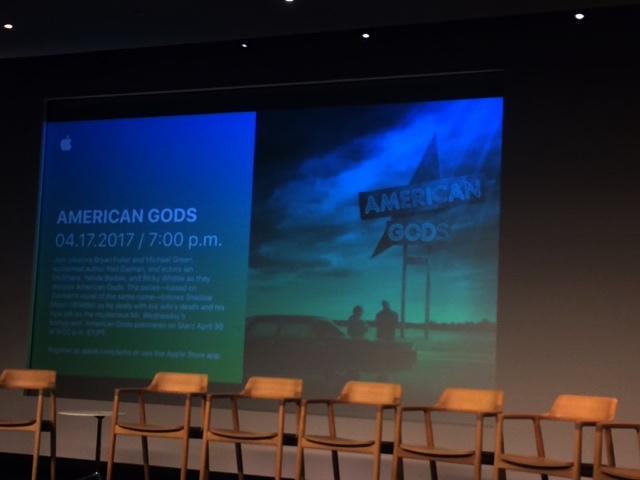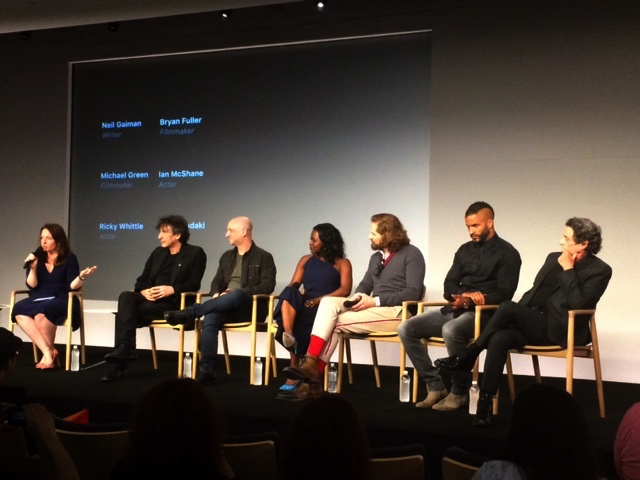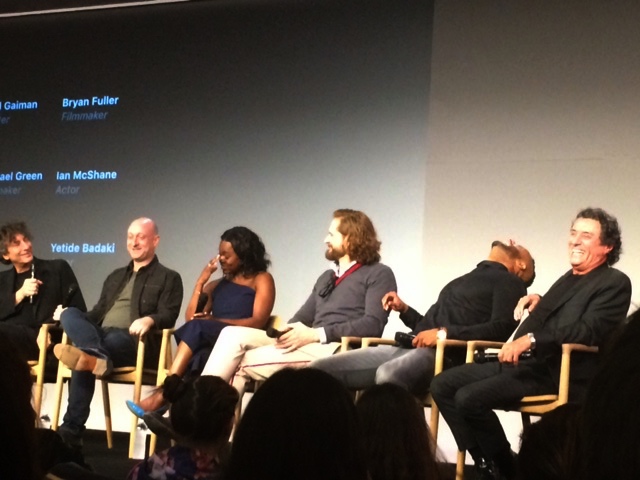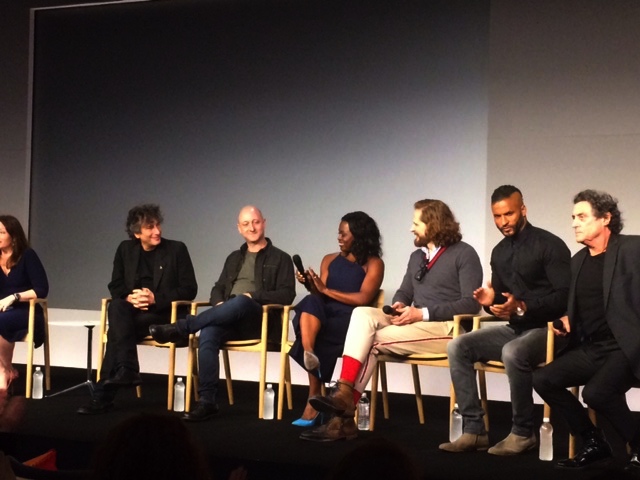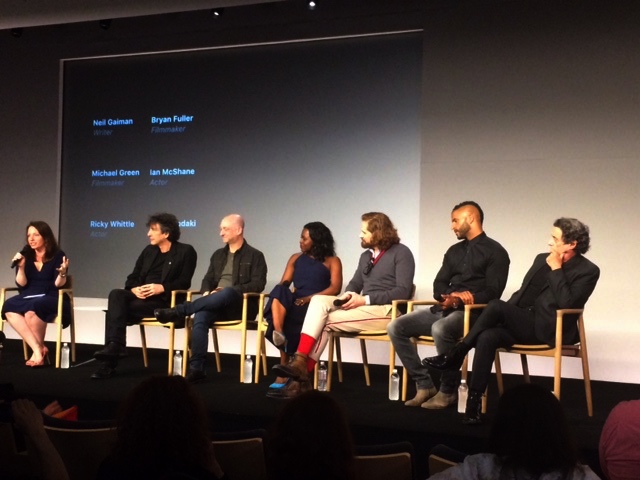Humanity finds itself stuck in the middle of a war brewing between the Old Gods and the New Gods. Translated onto the television screen, the critically acclaimed novel, American Gods, has become a must-see premiere event.
Before the series premiere airs April 30th on STARZ, a panel featuring the cast and crew was held at the Apple store in Soho. TV Line’s Executive Editor Kimberly Roots moderated the Q&A discussion with (in the following order) bestselling author Neil Gaiman (Sandman), showrunner Michael Green (Kings), actress Yetide Badaki (Masters of Sex), co-showrunner Bryan Fuller (Hannibal), actors Ricky Whittle (The 100) and Ian McShane (Deadwood).
Released from prison, ex-convict Shadow Moon (Whittle) discovers his wife was been killed in a terrible accident. While flying home for her funeral, Shadow is all of a sudden greeted by a mysterious man calling himself Mr. Wednesday (McShane). Together they embark on a surreal journey that will lead them directly towards a supernatural battle between the gods.
1. On The Parallels Between The Political Climate And The Book’s Themes:
Neil Gaiman: I do think it’s very peculiar, actually peculiar for all of us. The book that I wrote 17-18 years ago, Michael and Bryan wrote scripts 2-3 years ago, we filmed a year ago, now feels ridiculously prescient and appropriate. And like a political statement, I didn’t think stating, “This a nation of immigrants and this is a good thing,” was actually a political statement. I didn’t think having a racially diverse cast of characters in my book represented and reflected America was a political statement. It seemed like it was pretty damn obvious. And now the world has gone a little bit mad. It now seems like we are making a political statement and we are. But that wasn’t what we set out to do.
2. On Changes From The Book To Screen:
Bryan Fuller: It wasn’t much about changes so much as an increasing awareness of what we have gotten ourselves into. And the canary in the coal mine was Orlando Jones and the scene that starts episode two, which takes place on a slave ship. And it is Mr. Nancy telling the black man in the slave boat telling him what awaits him in America.
Gaiman: And what awaits him in America the next few 100 years.
Fuller: And 100 years after that and 100 years after that. And it was so moving because of the cast of black men who were playing the slaves in the hold. After Orlando did the first take, they gave him an ovation. And thats when we thought, we were just working on a story and we wanted it to have an emotional impact, but we didn’t realize how deep it had struck.
3. On The Differences Between Shadow Moon And Mr. Wednesday:
Ian McShane: I came upon the book on a short-lived NBC series called Kings. But that’s what you get for working with a network. Then Michael and I kept in touch over the years. And then he sent me this script and this character, Czernobog. I thought there are a ton of actors that can play this part better than I could. I got back to Michael. This is very nice of you Michael. I love the script but Mr. Wednesday is more interesting. Michael said, “I didn’t think you were interested in doing another TV series.”
I didn’t know Fuller then but I knew his work. They’ve done Mr. Gaiman proud. They are both creative people, Michael and Bryan, and they expanded upon his blueprint for a television show. And made it something he’s proud of, we’re all proud to be part of. I’m glad I didn’t do Czernobog because Peter Stromare is f**king amazing as Czernobog! It’s been a fun time!
I’d say Ricky has the most difficult part of the show. The deeper thing is Shadow represents the audience. The audience looks through the show through Shadow’s eyes. And Shadow is sort of a passive character. He’s not proactive, unlike me. So Ricky has to react to everything all the time. He’s actually quite wonderful doing that.
4. On The Role Of Bilquis, The Goddess Of Love And Her Sexuality
Yetide Badaki: It’s actually interesting because there are different parts to that, depending on which generation you were a part of. The older generations, through colonialism, have a different relationship to the body and to sexuality. But after colonialism, where I was raised, there was a definitely much more conservative view about sexuality.
It was interesting getting this part, because I had a conversation with my stepmother, who is very conservative. “What are you about to do?” But then it turned out to be an hour-long phone conversation where we talked really frankly about intimacy and sexuality, what it meant to me and what it meant her. I remember putting the phone down calmly. That was the first time I ever had that kind of conversation with my mother. It was profound for me. It made me think, if this is the kind of conversation that can happen on that level, I feel very lucky to be a part of it.
5. [SPOILERS: In The Most Fantastical Elements Of The Novel, Bilquis Seduces Her Prey And Swallows Him Whole Into Her Vagina.]
Green: As much as there was a lot of filmmaking that went into it, digital effects, the most impressive thing was performance. There was a depth of integrity and sensitivity to the role. One of the things that I look forward to is what happens after that scene. Because as shocking as it is, it’s what happens after is one of my favorite things of the series. So you’re getting to meet an actor who goes beyond the stunning and unexpected way you meet her.
That scene was her audition scene. She was professional! But what we saw there was sensitivity. The roads people have taken is just a cheat. And you can see years worth of character as a result. It’s very expensive filmmaking. It’s some incredible design work. Our director, David Slade, storyboarded it out, because it’s the question, “Okay, how do we get the man in?” The games of proportion to make it seem believable. But it’s a beautiful piece of filmmaking.
6. The Toughest Role To Cast Was For Shadow Moon
Gaiman: I mentioned in an interview that I had seen 600 people auditioning for Shadow. Michael said there was actually 1200. They only showed me the good ones. Ricky beat out 1200 people. We made him audition 16 times over 5 months.
Ricky Whittle: It was the most intense audition process I ever went through. I felt like I was in American Idol, every week I went in singing a different song. We really worked on developing Shadow from the book into this adaption onto screen. The character from the book is iconic as he was isn’t going to translate exactly. You don’t want to see a character think every week. Neil writes this incredible inner monologue. That’s not something we do on the show. So we had to add a few more layers, make him more vocal, some anxieties, fear, and some more emotions. As Ian said, he doesn’t push any of the story. He’s a leaf in a stream taken by the current. We just needed to add a little bit more. If it wasn’t for these notes from these wonderful people, I wouldn’t be sitting here today. I owe a lot to this incredible team and very grateful.
7. On The Extension Of The Roles For Bilquis And Shadow’s Wife, Laura Moon (Emily Browning)
Gaiman: With Laura (Browning), Bryan, Michael and I talked from the very beginning about showing her backstory. The novel is from Shadow’s point-of-view. It’s very rare that I’m allowed to nip out of his head. We only get to encounter Laura when she ends up crossing Shadow’s path. But we don’t know what she’s doing the rest of the time. The idea of pushing Laura up to a significant co-star was something we were agreement on from the beginning. With Bilquis, whose part has expanded, we get to do fantastic stuff in season one. And if they let us do season two and three, there’s going to be more shenanigans. That’s all Bryan and Michael. I love what they’ve done. We get to have more of Yetide on the screen.
8. On The Special Effects Of The Series
Whittle: It’s my first venture into blue/green screen. There are parts of the sets made up. You’re surrounded by a big green/blue wall. They add in all the special effects afterwards. It’s blind trust to the producers and directors. They are screaming at you on the side of the set. You have the conservation about what you’re really going to see. What am I looking at? What’s happening? You’re climbing a mountain of skulls! Skulls as far as you can see! There’s a huge tree! The tree’s big! There’s a buffalo! No he’s bigger! Oh Wow! Magical! Cut! You let that inner child out as an actor.
9. On The Coming To America Vignettes
Green: We love them and we wanted to see them. And all it would take is millions and millions of dollars.
Fuller: It was one of the swords me and Michael are willing to fall on for the show. As we were looking at the scope of the show, and how expensive it was to produce, the studio wanted to cut those parts because they didn’t have anything to do with the A-story. Michael and I said no repeatedly.
10. On Ideas For Season 2 Of American Gods
Gaiman: Season 1 ends before we get to the House on the Rock. Season 2 is going to begin on the House on the Rock. And things are going to happen!
American Gods premieres April 30th on STARZ.
All Photographs Taken By Jorge Solis
